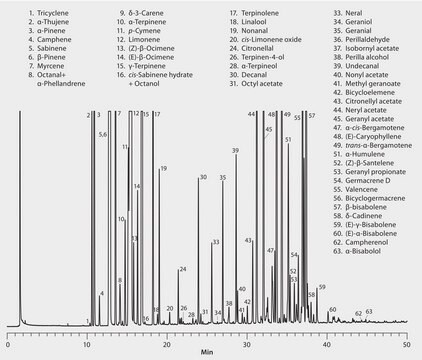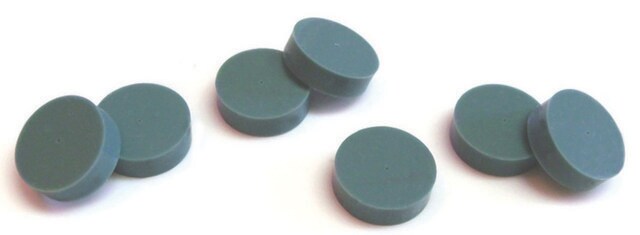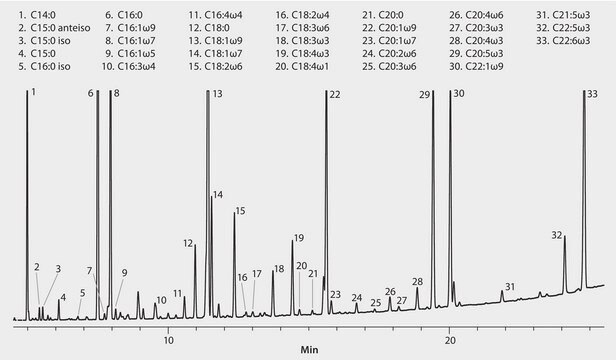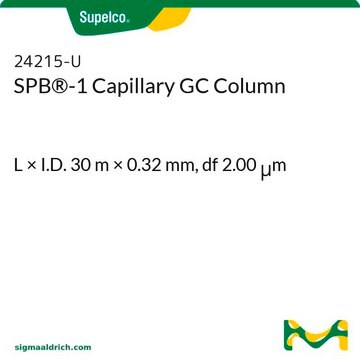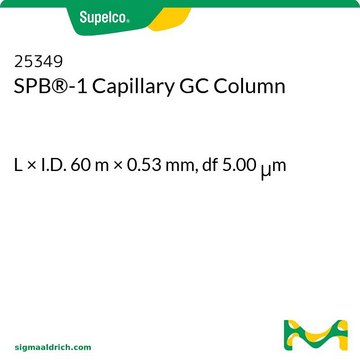Alle Fotos(1)
Wichtige Dokumente
24028
SPB®-1 Kapillar-GC-Säule
L × I.D. 30 m × 0.25 mm, df 0.25 μm
Anmeldenzur Ansicht organisationsspezifischer und vertraglich vereinbarter Preise
Alle Fotos(1)
About This Item
UNSPSC-Code:
41115710
eCl@ss:
32119290
Empfohlene Produkte
Materialien
fused silica
Qualitätsniveau
Agentur
meets requirements for USP G1, G2, and G9
Parameter
-60-320 °C temperature (isothermal or programmed)
Beta-Wert
250
df
0.25 μm
Methode(n)
gas chromatography (GC): suitable
L × ID
30 m × 0.25 mm
Aktive Matrixgruppe
Bonded; poly(dimethyl siloxane) phase
Säulenart
capillary non-polar
Suchen Sie nach ähnlichen Produkten? Aufrufen Leitfaden zum Produktvergleich
Verwandte Kategorien
Allgemeine Beschreibung
Anwendung: Diese Säule wird häufig für traditionelle Anwendungen für allgemeine Zwecke, bei denen eine unpolare Säule erforderlich ist, eingesetzt. Analyten werden primär gemäß ihres Siedepunkts getrennt.
USP-Code: Diese Säule entspricht den Anforderungen von USP G1, G2 und G9.
Phase:
USP-Code: Diese Säule entspricht den Anforderungen von USP G1, G2 und G9.
Phase:
- Gebunden
- Poly(dimethylsiloxan)
- ≤0,32 mm Innendurchmesser, <2 μm: -60 °C bis 320 °C (isotherm oder programmiert)
- ≤0,32 mm Innendurchmesser, ≥2 μm: -60 °C bis 300 °C (isotherm oder programmiert)
- ≥0,53 mm Innendurchmesser, <2 μm: -60 °C bis 300 °C (isotherm) oder 320 °C (programmiert)
- ≥0,53 mm Innendurchmesser, ≥2 μm: -60 °C bis 260 °C (isotherm) oder 280 °C (programmiert)
Anwendung
SPB®-1 Capillary GC Column was used for speciation of the nitrogen compounds (quantitatively), which are polar and somewhat basic in nature, with chemiluminescence detection.
Sonstige Hinweise
We offer a variety of chromatography accessories including analytical syringes
Rechtliche Hinweise
SPB is a registered trademark of Merck KGaA, Darmstadt, Germany
Lagerklassenschlüssel
10 - Combustible liquids
WGK
WGK 1
Flammpunkt (°F)
214.0 °F - closed cup
Flammpunkt (°C)
101.1 °C - closed cup
Hier finden Sie alle aktuellen Versionen:
Besitzen Sie dieses Produkt bereits?
In der Dokumentenbibliothek finden Sie die Dokumentation zu den Produkten, die Sie kürzlich erworben haben.
Kunden haben sich ebenfalls angesehen
C B'Hymer
Journal of chromatographic science, 45(6), 293-297 (2007-07-14)
An automated static headspace gas chromatographic method for the determination of residual solvents in the bulk drug substance alpha-phenyl-1-(2-phenylethyl)-piperine methanol, a serotonin 5-HT2 receptor antagonist, is evaluated. The method includes the use of 1-propanol as an internal standard. The gas
C B'Hymer
Journal of chromatographic science, 46(5), 369-374 (2008-05-22)
A static headspace gas chromatographic method is developed and evaluated for the quantitation of residual 2-propanol, methanol, and toluene in bulk (2alpha, 6alpha, 8alpha, 9alpha beta)-octahydro-3-oxo-2,6-methanon-2H-quinolizin-8-yl-1H-indole-3-caboxylate methanesufonate hydrate, a serotonin 5-HT3 receptor antagonist drug compound. This method is accurate and
Y Matsuzaki et al.
Yakugaku zasshi : Journal of the Pharmaceutical Society of Japan, 111(10), 617-620 (1991-10-01)
Gomisin A (TJN-101) is one of the lignan components isolated from Schisandra Fruits. A high sensitive and precise method for the determination of TJN-101 and its major metabolite (Met. B) in the rat serum was developed by selected ion monitoring
O S Fedianina
Genetika, 46(3), 332-339 (2010-04-16)
Tubulin-folding cofactor D is necessary for the assembly of tubulin heterodimers and, possibly, plays additional roles in the cell. The effects of cofactor D, microtubules, and/or tubulin dimers on the mitosis initiation were studied in Schizosaccharomyces pombe. It was found
J M Santiuste et al.
Journal of chromatography. A, 1002(1-2), 155-168 (2003-07-30)
The chlorinated organic compounds are very important from the point of view of the chemical industry and environmental protection, and therefore the gas chromatographic analysis of these compounds is very interesting for analytical chemists. In this paper we studied the
Unser Team von Wissenschaftlern verfügt über Erfahrung in allen Forschungsbereichen einschließlich Life Science, Materialwissenschaften, chemischer Synthese, Chromatographie, Analytik und vielen mehr..
Setzen Sie sich mit dem technischen Dienst in Verbindung.
